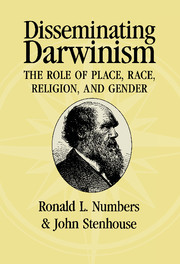Book contents
- Frontmatter
- Contents
- List of contributors
- Acknowledgments
- Introduction
- 1 Science, region, and religion: the reception of Darwinism in Princeton, Belfast, and Edinburgh
- 2 Darwin down under: science, religion, and evolution in Australia
- 3 Darwinism in New Zealand, 1859–1900
- 4 Environment, culture, and the reception of Darwin in Canada, 1859–1909
- 5 Darwinism in the American South
- 6 Darwinism, American Protestant thinkers, and the puzzle of motivation
- 7 Exposing Darwin's “hidden agenda”: Roman Catholic responses to evolution, 1875–1925
- 8 American Jewish responses to Darwin and evolutionary theory, 1860–1890
- 9 Black responses to Darwinism, 1859–1915
- 10 “The irrepressible woman question”: women's responses to evolutionary ideology
- Index
6 - Darwinism, American Protestant thinkers, and the puzzle of motivation
Published online by Cambridge University Press: 06 July 2010
- Frontmatter
- Contents
- List of contributors
- Acknowledgments
- Introduction
- 1 Science, region, and religion: the reception of Darwinism in Princeton, Belfast, and Edinburgh
- 2 Darwin down under: science, religion, and evolution in Australia
- 3 Darwinism in New Zealand, 1859–1900
- 4 Environment, culture, and the reception of Darwin in Canada, 1859–1909
- 5 Darwinism in the American South
- 6 Darwinism, American Protestant thinkers, and the puzzle of motivation
- 7 Exposing Darwin's “hidden agenda”: Roman Catholic responses to evolution, 1875–1925
- 8 American Jewish responses to Darwin and evolutionary theory, 1860–1890
- 9 Black responses to Darwinism, 1859–1915
- 10 “The irrepressible woman question”: women's responses to evolutionary ideology
- Index
Summary
The sustained labor of historians during the past six decades has provided us with a relatively clear understanding of the response of American Protestant intellectuals to Darwinism. We know, for example, that at the time that Charles Darwin published his Origin of Species in 1859, most Protestant thinkers in the United States assumed that interpretations of the history of life were inextricably bound up with beliefs that lay at the very heart of Christian theology. We now also know, however, that prior to the middle of the 1870s, virtually all spokespersons in the American Protestant community, recalling the fate of earlier transmutation hypotheses and aware that many reputable scientists were fiercely hostile to Darwin's work, concluded that the Darwinian hypothesis was a false system of metaphysics masquerading as science. Accordingly, insofar as they addressed themselves to that hypothesis at all, they tended to focus on its scientific deficiencies and its metaphysical affinities with the heretical works of Thomas Huxley, Herbert Spencer, and John Tyndall. Only after 1875, when it had become abundantly clear that the scientific community had endorsed the theory of organic evolution, did American Protestant thinkers feel compelled to engage in a sustained assessment of its theological implications. During the next quarter of a century most of them concluded that judicious modifications of traditional formulations of Christian doctrine would enable them to accept the transmutation hypothesis. Not all Protestant opinion leaders, however, endorsed that view.
- Type
- Chapter
- Information
- Disseminating DarwinismThe Role of Place, Race, Religion, and Gender, pp. 145 - 172Publisher: Cambridge University PressPrint publication year: 1999
- 14
- Cited by



